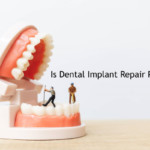Bone loss may result in osteopenia, a condition in which you begin to lose bone mass, resulting in weaker bones. Bone loss may also lead to a more serious illness known as osteoporosis, a bone disease that occurs when the body produces too little bone, loses too much bone, or both. As a result, bones become brittle and may shatter with a small impact.
How long is the healing phase after getting dental implants?
 This is a multi-step procedure that is often used for tooth restoration. It is possible that more than one healing step is required. As a result, the time it takes to recuperate might vary depending on whether one, all-on-4, or all teeth need to be replaced, the patient’s health, and so on. Here is a summary of the processes that occur between the procedure and recuperation; once accomplished, you will have healthy, new teeth.
This is a multi-step procedure that is often used for tooth restoration. It is possible that more than one healing step is required. As a result, the time it takes to recuperate might vary depending on whether one, all-on-4, or all teeth need to be replaced, the patient’s health, and so on. Here is a summary of the processes that occur between the procedure and recuperation; once accomplished, you will have healthy, new teeth.
- Is the patient’s teeth bone loss evident? First, bone grafting should be done. A four to six-month delay may be required before the next phase can be completed. Grafting is only required if the patient lacks sufficient healthy bone where the implant will be implanted.
- If grafting is not necessary but extractions are required, a grace period for gum damage is also required. Recently, doctors have been able to put them at the same time as the extractions, eliminating the need for a second healing period. A cap is applied to the dental implant before the gum tissue is sewn. Depending on the patient’s condition, healing might take up to a week.
Check out the average cost of this treatment.
- Following four to six months, a second surgery is conducted. The implant will have bonded with the implant metal by then. The cap is left exposed, and the gum is sutured around it. The gum heals around the cap and conforms to its contour.
- They may remove the healing cap and install an abutment, where the denture or artificial tooth can be inserted, after the gum has fully healed and osseointegration has finished.
Osseo-integration – Osseo-integration is a procedure that gives implants their strength and support. This is the process through which bone cells develop onto the implant surface after being implanted into the bone. This results in a deep relationship, and the implant becomes a part of it. It takes time; the procedure might take anywhere from two to six months to finish.
What Affects Dental Implant Recovery Time?
Because getting dental implants is a surgical procedure, recuperation time varies from person to person, making it impossible to forecast how long this process will take. However, several circumstances might have an impact on the time it takes for the implants to heal. These are some examples:
- The total number of teeth removed and implanted (single, multiple or whole jaw).
- If your bone is in good enough condition for the implants to attach to.
- If your procedure necessitates bone grafting.
- Your overall oral hygiene and bone structural health.
- The speed with which your body recovers.
- If you smoke recovery time is also affected.
If you underwent a straightforward implant procedure with no grafting, you should have little to no swelling or pain following the procedure. If you do, it will most likely just last a few days. Medication will be prescribed by your dentist to assist alleviate the discomfort. After 10 days, you should be ready to resume your normal diet. However, patients are occasionally recommended to follow a soft diet for many weeks following surgery.
If a failing tooth must be extracted, the implant procedure may take longer than normal since dentists must wait for the bone to heal before inserting an implant to reconstruct the tooth.
In rare cases, the implant may be put the same day that the tooth is removed. This is beneficial since it may shorten the patient’s recovery period and allow them to receive their teeth sooner. However, not all patients are candidates for immediate implantation. You should consult with your dentist to see whether you are a candidate for Same Day Dental Implants. See more about Can dental implants be restored?
How to care for your tooth implant after surgery?
- Any soreness should subside during the first 24 to 48 hours.
- Pain medication and moist heat may help to shorten the healing period.
- For the first several days, stick to soft meals and avoid excessive physical activity.
- To avoid harming the sutures, use a soft-bristled toothbrush and gentle strokes.
- Use a special mouthwash to help kill oral bacteria.
- Several times every day, rinse your mouth with warm salt water.
- Once the gums have healed, you should care for them in the same way as you would your original teeth. Brushing teeth at least twice a day and using dental floss at least once a day.
- Special brushes and floss may assist you in cleaning the difficult-to-reach areas of your dental implants.
- Make time for regular checkups and cleanings.
- Your tooth implants may last the rest of your life if you take excellent care of them, practice regular dental hygiene, and maintain them properly.
If you experience any signs of failure in your treatment, please schedule an appointment or contact our dentist immediately.
Sources:


